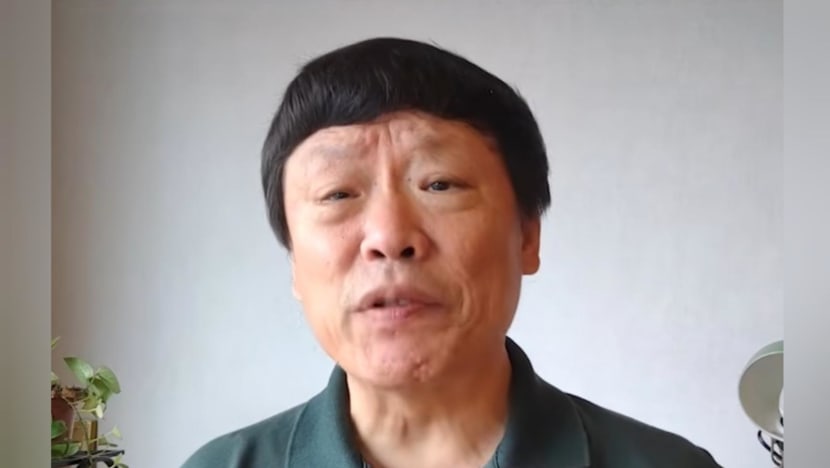Former Global Times top editor Hu Xijin goes dark on social media after now-deleted article on China’s economic strategy
At the heart of the matter is a now-deleted article by Mr Hu, weighing in on the outcomes of the recent third plenum. He had written that the omission of a phrase long enshrining the role of the state sector in China’s economy showed that the country hoped to “achieve true equality between the private and the state-owned economy”.

A screengrab from a video of former Global Times editor Hu Xijin taken from his WeChat account. (Image: WeChat/Hu Xijin)
SINGAPORE: Prolific Chinese nationalistic commentator Hu Xijin has gone silent on social media after publishing an article analysing China’s economic strategy, in an indication of the heightened sensitivity around discussions on the country’s economy.
The former editor-in-chief of the state-run Global Times was banned from posting on social media after he wrote controversial comments about the world's second-largest economy, Bloomberg reported on Thursday (Aug 1), citing a “person familiar with the matter”. Neither the entity behind the purported ban nor its length was specified.
At the heart of the matter is a now-deleted article Mr Hu posted on his WeChat account on Jul 22, weighing in on the outcomes of the third plenum, a reform-focused meeting by the upper echelons of China’s Communist Party (CCP).
The top-level gathering took place last month, yielding a resolution document that was long on commitments but short on specifics, although analysts singled out hints that President Xi Jinping is seeking a fourth term as China’s helmsman.
According to the South China Morning Post (SCMP), Mr Hu wrote that the resolution left out a phrase that had long enshrined the role of the state sector in the country’s economy.
He argued that the omission of the phrase “public ownership playing a dominant role” was a “historic change” that showed China hoped to “achieve true equality between the private and the state-owned economy”.
“Chinese society’s understanding, attitude and narrative of various ownership relations will have a big step forward,” Mr Hu wrote.
ANALYSIS TRIGGERS BACKLASH
SCMP reported that Mr Hu’s interpretation triggered fierce criticism from local conservative bloggers, who accused the former Global Times editor of “blatantly violating the political discipline of the party” because the “dominant role” of public ownership was enshrined in the constitutions of both the ruling party and the country.
People’s Daily, the official newspaper of the CCP, also published a front-page commentary on Tuesday, stating that China’s basic stand on the state and private sectors “hasn’t changed and won’t change in the future”.
While the commentary did not make any reference to Mr Hu’s piece, the article stated that the plenum’s resolution emphasised “upholding and improving the basic socialist economic system”, SCMP reported.
This encompassed the party’s stance that public ownership was the mainstay of China’s economic system, which allowed diverse forms of ownership to develop together, the article wrote.
A check by CNA on Friday (Aug 2) showed that Mr Hu’s social media accounts - Weibo, WeChat and X, formerly known as Twitter - have been silent since last Saturday. Mr Hu has more than 24 million followers on Weibo and over half a million on X, while WeChat does not show his follower count.
Both Bloomberg and SCMP were unable to reach Mr Hu for comment. However, Mr Hu was quoted by Hong Kong newspaper Sing Tao Daily on Jul 30 as saying: “I personally don’t want to say anything. You can just read things online. Please be understanding.”
Mr Hu retired from the Global Times in late 2021. He said then that he would stay on as a commentator for the paper, and had been active on social media up till this latest development.
While not an official government spokesman, Hu has been one of the loudest pro-China voices on X, which is blocked in the country, defending the party line on subjects from handling COVID-19 to disputes with Australia and the United States.
His online comments and regular newspaper column "Hu Says" have reflected what is widely perceived to be increasingly strident Chinese nationalism, and he is frequently quoted in foreign media.
In 2022, Mr Hu remarked on then-US House Speaker Nancy’s Pelosi Taiwan visit, tweeting that China’s military should take down her plane if she was escorted by American fighter jets on arrival.
More recently, Mr Hu waded in on nationalistic attacks against Nobel laureate Mo Yan and drinks giant Nongfu Spring. He defended Mo Yan, accusing naysayers of “using the banners of patriotism” as a scapegoat to criticise people and issues.
The latest incident has highlighted increasing sensitivity within China over discussion of the economy, which is facing strong headwinds.
International media outlets like The Guardian and Financial Times reported last year that China had censored financial bloggers, amid a crackdown on negative economic commentary.














